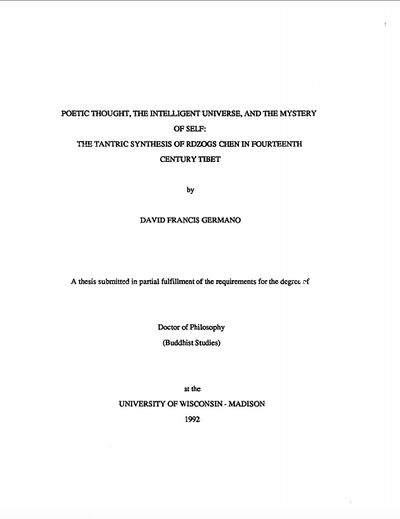Poetic Thought, the Intelligent Universe, and the Mystery of Self: The Tantric Synthesis of rDzogs Chen in Fourteenth Century Tibet
Abstract
The rDzogs Chen tradition is an extremely innovative philosophical and contemplative system originating out of Buddhist Tantric mysticism within the 8th-10th centuries, and in many ways is quite unusual in the context of normative Indo-Tibetan Buddhism. While its origins remain controversial, we currently possess only a large body of canonical and exegetical literature in what claim to be Tibetan translations, as well as an extensive secondary literature that developed in Tibet from the 10th-20th centuries. The tradition is especially striking in its implicit development of a model of rigorous philosophical thought that refuses to be reduced to syllogistic reasoning (though utilizing it as a secondary hermeneutical tool) or dismissed as mere "aesthetics" as it treats Buddhist Tantra as a serious philosophical innovation that must be utilized to reinterpret previous traditional scholasticism, in stark contrast to the trend to extend traditional scholastic methodologies into Tantra, and deny the revolution of "poetic thought" they may embody. In addition, its complex evolutionary emphasis and description of a non-reified intelligence operative at every level of the Universe is strikingly similar to recent developments in modern scientific research. Finally, it would seem that the Great Perfection represents the most sophisticated interpretation of the so-called "Buddha nature" tradition within the context of Indo-Tibetan thought, and as such, is of extreme importance for research into classical exoteric philosophic systems such as Madhyamaka and Yogācāra, while also providing fertile grounds for future explorations of the interconnections between Indo-Tibetan and East Asian forms of Buddhism, as well as between Indo-Tibetan Buddhism and contemporary Indian developments such as the tenth century non-dual Shaivism of Abhinavagupta.
Though this tradition is by no means homogenous, one can readily distinguish out a classical system encapsulated by "eleven adamantine topics" (rDo rJe'i gNas bCu gCig), which together constitute a wide ranging journey spanning the early history of the Universe to the climaxing heights of a Buddha's full enlightenment. This system is most brilliantly articulated by the fourteenth century Tibetan scholar kLong Chen Rab 'Byams Pa (1308-1363) in his The Seven Treasuries (mDzod bDun) and The Seminal Heart-Essence in Four Parts (sNying Thig Ya bZhi), which contain some of the world's most profound poetic and philosophic masterpieces. This dissertation thus bases itself on Longchenpa's corpus, and his own textual sources, namely The Seventeen Tantras, The Seminal Heart-Essence of the Sky Dancer (mKha' 'Gro sNying Thig) by Padmasambhava, and The Seminal Heart-Essence of Vimalamitra (Bi Ma sNying Thig) by Vimalamitra and other early non-Tibetan figures in the tradition. In particular, it focuses on kLong Chen Rab 'Byams Pa's The Treasury of Words and Meanings (Tshig Don mDzod) which is directly structured on the aforementioned eleven topics, and is his most succinct yet extensive exposition of the tradition of the Great Perfection in its entirety. Part I is an overview of these eleven topics in general, as well as in the context of The Treasury of Words and Meaning's corresponding eleven chapters; Part II consists of a translation of the first five chapters from The Treasury of Words and Meanings (centering on the primordial
nature of the Universe, the early history of its exteriorization into space and time, the
origination of alienation, evolution, and a subtle analysis of the energetics of human existence);
and Part III provides a very lengthy commentary on those five chapters in the form of running
annotations (the bulk of the thesis thus occurs in Part Ill). In Part Ill, the above texts are
systematically analyzed in relation to Longchenpa's discussions of a given issue, and many lengthy passages extracted from them are translated therein, along with extensive interpretative
comments.
Although some scholars have attempted to marginalize the tradition in relation to Indo-Tibetan Buddhism, in fact the Great Perfection can be understood as its culmination, since in its seamless blend of the exoteric and esoteric it overcomes many of the limitations inherent in the "normative" traditions' sterile division between "philosophy" and the esoteric practices/theory of Tantra. This dissertation clarifies the essential structure, orientation, and content of the tradition, as well as providing a very detailed explication of the first five of the eleven topics
encapsulating its overall range. The larger work from which it is drawn contains a systematic treatment of all eleven topics, along with a comprehensive translation (and independent commentary on) The Treasury of Words and Meanings.
| Citation | Germano, David Francis. "Poetic Thought, the Intelligent Universe, and the Mystery of Self: The Tantric Synthesis of rDzogs Chen in Fourteenth Century Tibet." PhD diss., University of Wisconsin-Madison, 1992. |
|---|---|

